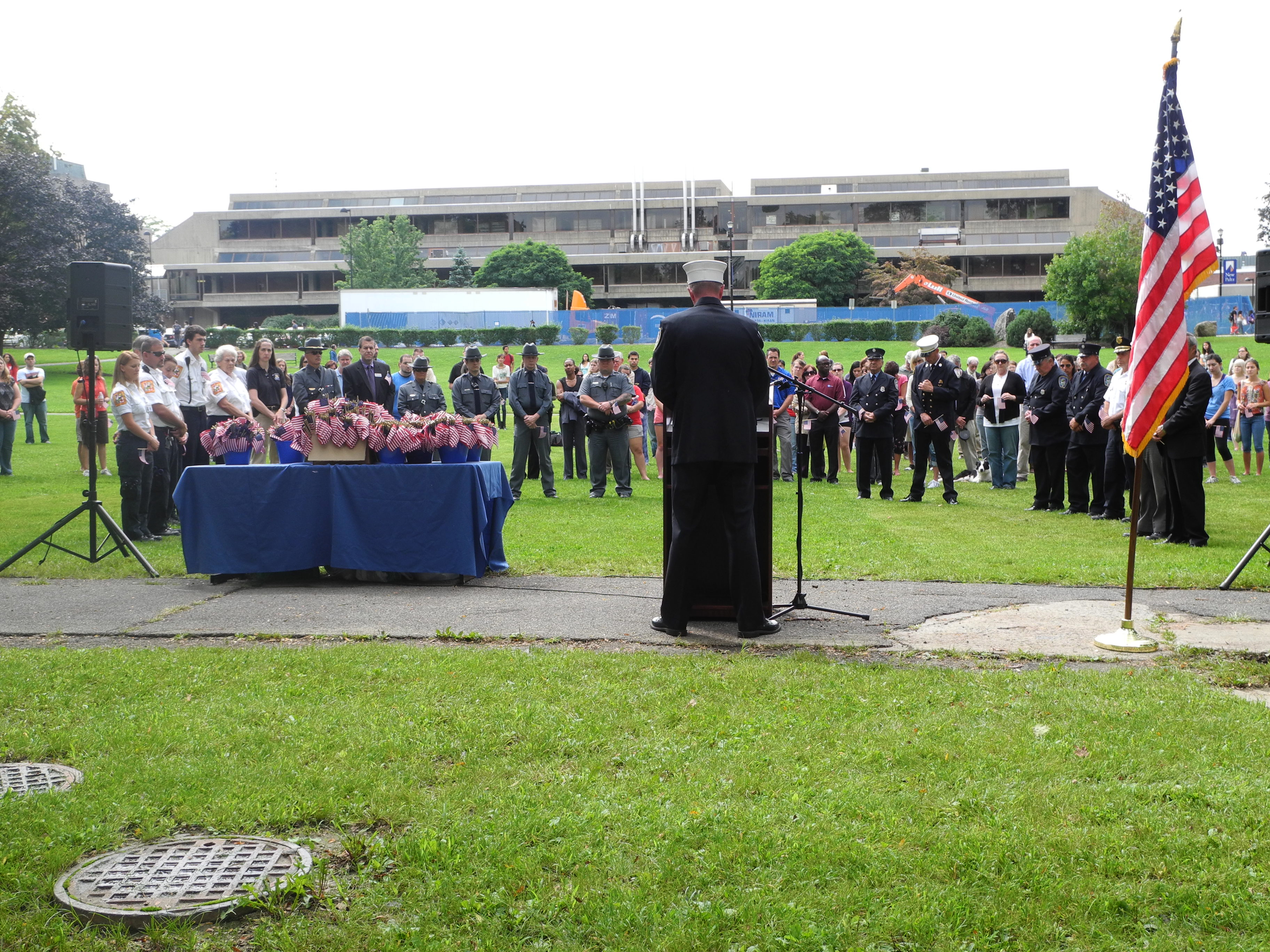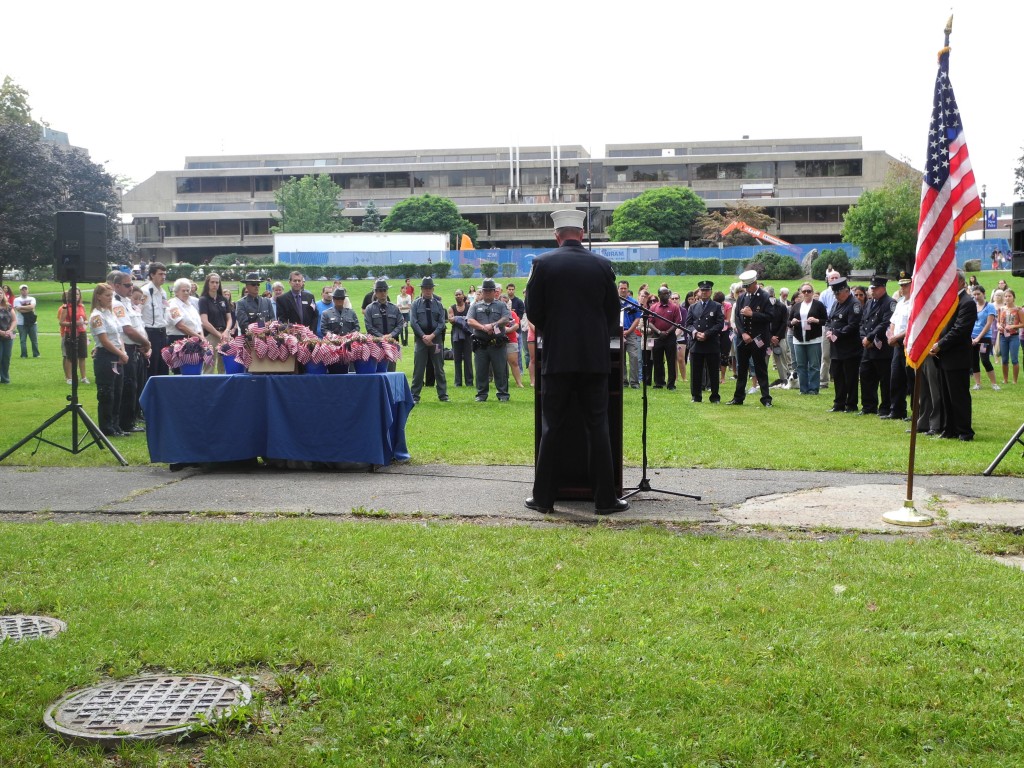

New Paltz Fire Department Chief Kevin McGuire said he was a little hesitant to step up to the podium facing Old Main Quad on Sept. 9, 2011. However, the firefighter said he overcame his fears for the sake of colleagues, friends and others who died on Sept. 11, 2001.
“I don’t like public speaking -— I like being a firefighter,” McGuire said. “But when I was told I would be representing all of the first responders from that day, I was absolutely honored.”
On Friday, SUNY New Paltz hosted a flag planting ceremony on campus in remembrance of those killed in the terrorist attacks of Sept. 11, 2001 and in recognition of all of the first responders who risked or gave their lives in pursuit of helping others.
“Today, we remember those who died — almost 3000 individuals, but we also recognize the special role of first responder’s in this and other crisis we face,” President Donald Christian said in his opening speech of the ceremony. “Very likely, some of those with us today were part of that effort, and we honor them today.”
Students, faculty, staff and members of the New Paltz community gathered with members of the New Paltz Fire Department, Police Department and Rescue Squad on Old Main Quad and were invited to plant 3000 miniature American flags in the outline of two towers, each one in remembrance of those who were killed on Sept. 11 and the 1993 bombing of the World Trade Center.
“We asked people to leave the flags untouched until the bells of Van den Berg Hall ring on Sunday morning of the exact times of the attacks on the Pentagon, the World Trade Center and the crash of Flight 93,” Christian said. “After those chimes, we encouraged people to take a flag as a memento of the event.”
Before flags were planted, Christian introduced three guest speakers for the ceremony – McGuire, Director of the Institute for Disaster Mental Health James Halpern and Rev. Tobias Anderson, all of whom offered different perspectives on the aftermath and continued progression our country has gone through after that day.
During his speech, McGuire said every member of the community, whether they were a responder or a citizen, went through the same grieving process. He also asked the crowd to remember the patriotism felt after the attacks, out of respect for those who risked their lives that day.
“We weren’t aware that people were out there, wanting to do us harm,” McGuire said. “Well, we’re aware now and with the increased threats for this weekend, I can assure you one thing – when and if it happens again, small or large, first responders will be there.”
McGuire said he believes the perception of Sept. 11 has changed over the last ten years and he believes The United States needs to remember and return to the feelings shared that day.
“I think complacency is somewhat returning to our society,” McGuire said. “After the attacks everyone was so patriotic and outgoing and now we’re slowly returning to the way things were before hand which was complacency. I think that’s going to lead to another event and it’s sad to see that. I think the flags here are wonderful, but these days you’re hard pressed to find a flag flying anywhere in town, and that is truly sad.”
Halpern, who followed McGuire’s speech, stressed that people are still affected by the attacks today and deserve attention and help. He also read testimonials of those who were children on the day of the attacks.
According to Halpern, who went to Ground Zero following the attacks to offer first aid and helped evacuate an assisted living home, it may take decades before we know the full extent of the emotional and physical trauma for workers, their families, residents and others exposed.
“The ripple effect of 9/11 was so great that there is a danger that someone who needed and still needs care can be overlooked,” Halpern said. “Tens of thousands of men and women worked with the recovery efforts at Ground Zero, recovering more than 30 thousand body parts at an extraordinary personal cost.”
At the conclusion of the ceremony, Anderson (of Redeemer Evangelical Church in New Paltz) took the podium and led those in attendance in a moment of silence and general prayer before inviting the first responders to plant flags, followed by the public.
Slowly, members of the campus community quietly placed flags into the ground – some closing their eyes and saying a few words while others paid their respects and departed.
After the ceremony, Christian said he believed the way people view Sept. 11 after 10 years was “complex.”
“I think [people have] realized the complexity of the way we have responded as a nation and the kind of impact it had on how we view ourselves in the world,” Christian said. “I think that complexity of the consequences of the attacks is one that sobers people and people continue to grow in their awareness of the implications it had for all of us.”
